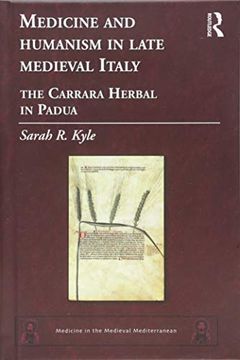Compartir
Medicine and Humanism in Late Medieval Italy: The Carrara Herbal in Padua (en Inglés)
Sarah R. Kyle
(Autor)
·
Routledge
· Tapa Dura
Medicine and Humanism in Late Medieval Italy: The Carrara Herbal in Padua (en Inglés) - Kyle, Sarah R.
$ 2,751.14
$ 5,502.28
Ahorras: $ 2,751.14
Elige la lista en la que quieres agregar tu producto o crea una nueva lista
✓ Producto agregado correctamente a la lista de deseos.
Ir a Mis Listas
Origen: Reino Unido
(Costos de importación incluídos en el precio)
Se enviará desde nuestra bodega entre el
Miércoles 24 de Julio y el
Lunes 05 de Agosto.
Lo recibirás en cualquier lugar de México entre 1 y 3 días hábiles luego del envío.
Reseña del libro "Medicine and Humanism in Late Medieval Italy: The Carrara Herbal in Padua (en Inglés)"
This book is the first study to consider the extraordinary manuscript now known as the Carrara Herbal (British Library, Egerton 2020) within the complex network of medical, artistic and intellectual traditions from which it emerged. The manuscript contains an illustrated, vernacular copy of the thirteenth-century pharmacopeia by Ibn Sarābī, an Arabic-speaking Christian physician working in al-Andalus known in the West as Serapion the Younger. By 1290, Serapion's treatise was available in Latin translation and circulated widely in medical schools across the Italian peninsula. Commissioned in the late fourteenth century by the prince of Padua, Francesco II 'il Novello' da Carrara (r. 1390-1405), the Carrara Herbal attests to the growing presence of Arabic medicine both inside and outside of the University. Its contents speak to the Carrara family's historic role as patrons and protectors of the Studium, yet its form - a luxury book in Paduan dialect adorned with family heraldry and stylistically diverse representations of plants - locates it in court culture. In particular, the manuscript's form connects Serapion's treatise to patterns of book collection and rhetorics of self-making encouraged by humanists and practiced by Francesco's ancestors. Beginning with Petrarch (1304-74) and continuing with Pier Paolo Vergerio (ca. 1369-1444), humanists held privileged positions in the Carrara court, and humanist culture vied with the University's successes for leading roles in Carrara self-promotion. With the other illustrated books in the prince's collection, the Herbal negotiated these traditional arenas of family patronage and brought them into confluence, promoting Francesco as an ideal 'physician prince' capable of ensuring the moral and physical health of Padua. Considered in this way, the Carrara Herbal is the product of an intersection between the Pan-Mediterranean transmission of medical knowledge and the rise of humanism in the Italian courts, an intersection typically attributed to the later Renaissance.
- 0% (0)
- 0% (0)
- 0% (0)
- 0% (0)
- 0% (0)
Todos los libros de nuestro catálogo son Originales.
El libro está escrito en Inglés.
La encuadernación de esta edición es Tapa Dura.
✓ Producto agregado correctamente al carro, Ir a Pagar.

